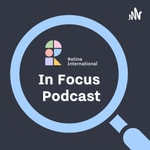In Focus – Details, episodes & analysis
Podcast details
Technical and general information from the podcast's RSS feed.

In Focus
Retina International
Frequency: 1 episode/20d. Total Eps: 21

Recent rankings
Latest chart positions across Apple Podcasts and Spotify rankings.
Apple Podcasts
🇨🇦 Canada - nonProfit
31/01/2025#96🇨🇦 Canada - nonProfit
30/01/2025#76🇨🇦 Canada - nonProfit
29/01/2025#67🇨🇦 Canada - nonProfit
28/01/2025#51🇨🇦 Canada - nonProfit
27/01/2025#40🇨🇦 Canada - nonProfit
26/01/2025#27🇨🇦 Canada - nonProfit
25/01/2025#19🇨🇦 Canada - nonProfit
23/11/2024#99🇨🇦 Canada - nonProfit
22/11/2024#94🇨🇦 Canada - nonProfit
21/11/2024#77
Spotify
No recent rankings available
Shared links between episodes and podcasts
Links found in episode descriptions and other podcasts that share them.
See allRSS feed quality and score
Technical evaluation of the podcast's RSS feed quality and structure.
See allScore global : 43%
Publication history
Monthly episode publishing history over the past years.
Series 2, Episode 8: Christina Fasser
Season 2 · Episode 8
lundi 19 septembre 2022 • Duration 19:23
In this episode of the In Focus Podcast, we sit down with former RI president Christina Fasser to talk about the challenges the retina community face when emerging from lockdowns into the “new normal.” Christina talks about adjusting to changes in one’s surroundings, attending regular eye check-ups, and re-entering the job market, as well as what governments and policymakers can do to ease these transitions.
Season 2, Episode 7: Elfride De Baere
jeudi 2 juin 2022 • Duration 17:47
In this episode of the In Focus podcast, Retina International CEO Avril Daly speaks with Elfride De Baere about the importance of receiving a genetic diagnosis for IRDs.
Elfride De Baere, MD, PhD, is currently Professor of Ophthalmic Genetics at Ghent University, clinical geneticist at the Center for Medical Genetics, Ghent University Hospital and Senior Clinical Investigator of the Research Foundation Flanders (FWO). Her research areas of interest are the genomic and pathophysiological basis of inherited retinal diseases; developmental genetics and gene regulation; and clinical and functional genomics. She is the coordinator of several European research consortia and member of the European Retinal Disease Consortium (ERDC) and the European Reference Network for Rare Eye Diseases (ERN-EYE). Elfride serves/ on the scientific program committee of ARVO and ESHG and is on the Scientific Advisory Board of the Foundation Fighting Blindness.
In this episode, Avril and Elfride discuss the importance of genetic testing for IRDs from the perspective of research. Elfride tells us of the benefits of receiving a genetic diagnosis for retinal patients and their families, as well as the challenges that people in different regions face in accessibility. They close the episode by discussing what gives them hope for the future of genetic testing, including electronic platforms, educational programs, international registries, and more.
Season 1, Episode 11: Russell Wheeler
Season 1 · Episode 11
mardi 24 août 2021 • Duration 34:05
This week, Avril welcomes Russell Wheeler to the Retina International In-Focus podcast. Since the diagnosis of his son with Leber Hereditary Optic Neuropathy, a rare and inherited retinal condition, Russell has been a long-standing patient advocate within the retina community, working at a European level and as a patient representative on the board of the ERN-EYE.
In this episode, Russell explains in great detail the Health Technology Assessment (HTA) process, which is designed to collect and summarise information about a health technology such as drugs and medical devices with respect to their safety and effectiveness, as well as ethical, legal and other issues.
In his conversation with Avril, Russell highlights the importance of patient engagement and involvement with the HTA process, and how, in his experience, having the patient perspective and voice as a key component in the decision making process has benefitted the outcomes for patient communities.
Season 1, Episode 10: Petia Stratieva
Season 1 · Episode 10
mardi 24 août 2021 • Duration 20:05
This week, RI Science Communications Executive, Seán Heagney welcomes Petia Stratieva, MD, PhD to the In-Focus podcast. Petia is a medical doctor and passionate patient advocate as a person living with Retinitis Pigmentosa who also has significant experience working in industry and thus understands the perspective of many stakeholders within the retina community.
In this episode, Petia explains to Seán the challenges she and many others face to raise awareness around retinal conditions, including inherited retinal diseases (IRDs) in Bulgaria and Eastern Europe and how this inspired her to establish Retina Bulgaria in 2018.
Petia also speaks in depth about the importance of inter-organisational engagement throughout Europe and the globe, as well as the need for transnational partnership to support the establishment of smaller and more recently founded organisations to help them grow and contribute as a vital part of the global community.
Season 1, Episode 9: Chad Andrews
Season 1 · Episode 9
mardi 24 août 2021 • Duration 17:58
In episode 9 of the In-Focus podcast, Avril is joined by Chad Andrews from Fighting Blindness Canada (FBC). Chad works at FBC as Senior Advisor on Policy, Equity and Access. In their discussion, Avril and Chad discuss the multifarious projects and educational initiatives he has been involved in with FBC, including Vision Class and the Young Leaders Program as well as other newly established projects to support FBC’s members during COVID-19.
Chad speaks in detail about some of FBC’s current initiatives, including Vision Quest and FBC’s ongoing webinar series View Point, which ranges from presentations on scientific research, such as stem-cell therapy, to discussions on social distancing and coping with sight loss during COVID-19. Registration for these webinars is free and can be done on the FBC website, where recording for previously-held meetings can also be found.
Chad also explains to Avril the burden-of-illness studies being conducted by FBC during this time to understand the challenges and obstacles of living with vision loss from the patient’s perspective, as well as their Cycle For Sight fundraising event which is scheduled for Saturday June 20th 2020.
It’s certainly not an episode to be missed!
Season 1, Episode 8: Carol Brill
Season 1 · Episode 8
mardi 24 août 2021 • Duration 20:26
In episode 8 of the In-Focus podcast, Avril welcomes Carol Brill to speak about her life and experience as a person living with Usher Syndrome during the COVID-19 pandemic.
In addition to being on the Board of Directors for Fighting Blindness Ireland and CureUsher, Carol is very involved with the Retina International Usher Syndrome Special Interest Group and leads a very active lifestyle, as a member of her local Stackstown golf club and Irish Blind Golf.
In her interview with Avril, Carol speaks openly and honestly about how the current pandemic has impacted her as a person living with a visual impairment, and the issues she has faced with respect to the accessibility of many virtual platforms for the visually impaired community. As these means of communication become more prominent, Carol recognises that special considerations will need to be made to make these technologies more inclusive and accessible for the retina community.
Additionally, as a person living with what she describes to be an “invisible” disability, Carol highlights the importance of raising awareness around the reality of retinal conditions and other disabilities which are not so easily recognised and urges us to become a more compassionate and considerate society post COVID-19.
Season 1, Episode 7: Professor John Flannery
Season 1 · Episode 7
mardi 24 août 2021 • Duration 12:59
This week, Avril welcomes Professor John Flannery to the Retina International In-Focus podcast. John is Professor of Vision Science and Neuroscience in the Department of Molecular Biology in University of California, Berkeley.
In this episode, John’s explains the concept of optogenetics; a technique which involves light and genetic engineering (editing the genetic information) to control neuronal cells, and how he is applying it in his research to restore normal light-sensing capability to the photoreceptor cells of the retina and treat retinal conditions.
Photoreceptor cells are responsible for detecting light which enters the eye and converting it to electrical impulses which are delivered to the brain, so images can be formed of our external environment. As many common and rare retinal conditions are caused by the degeneration and death of the rod and cone photoreceptor cells to cause a decline in peripheral or central vision respectively.
In addition to discussing optogenetics, John also discusses other forms of gene therapy which are being investigated in treating a number of common and inherited retinal diseases, including Age-related Macular Degeneration and Leber Congenital Amaurosis.
Season 1, Episode 6: Marina Sutter
Season 1 · Episode 6
mardi 24 août 2021 • Duration 16:41
This week, Dr. Orla Galvin Director of Research Policy at Retina International hosts and welcomes Marina Sutter, Interim Chair of the Retina International Youth Council to our latest episode in a series of In-Focus podcasts.
At the age of 12, Marina was diagnosed with an inherited retinal disease (IRD) called Stargardt Disease, a form of Juvenile Macular Degeneration. Although a challenging time for her, Marina remembers fondly the incredible support she received from her teachers and parents, who supported and empowered her throughout her journey. However, through Marina’s involvement and experience in the retina community at large, she is acutely aware that many young people have not had the same positive experiences, with many lacking similarly empowering figures in their lives.
Through her role at Retina International as Interim Chair of the Retina Youth Council, Marina is working to provide comprehensive resources and social supports for young people living with retinal degenerations globally. Additionally, Marina believes this will help to establish a wide-reaching and welcoming community for young people to share their experiences, meet other young people in similar circumstances and realise they are not alone, something Marina regrets to admit she has heard too often from young people in the past.
Season 1, Episode 5: Michael Griffith
Season 1 · Episode 5
mardi 24 août 2021 • Duration 20:52
In episode 5 of the In-Focus podcast, Avril is joined by Michael Griffith. Michael was a founder of Fighting Blindness Ireland in 1983 and has been a central figure in the retina community, advocating for the progression of retinal research and the establishment of policies which will support people living with retinal conditions, for over 20 years.
Michael lives with Retinitis Pigmentosa and is a firm believer in the power of mindfulness to re-connect us with the present moment, develop resilience and offer tools to help us cope with the struggles of daily life. In addition to serving the retina community, mindfulness is beneficial for everyone and is especially important during these challenging times in face of the COVID-19 pandemic.
Since retiring as CEO from Fighting Blindness Ireland, Michael has been involved in promoting mindfulness in Ireland and abroad, and is a proud co-founder of Mindful Nation Ireland. Through this work, Michael hopes to spread the practice of mindfulness and promote its integration into wider society, engaging with politicians and leaders both in Ireland and on an international scale so that we can begin to lead a more content and fulfilling life together.
Season 1, Episode 4: Professor Joe Carroll & Adaptive Optics
Season 1 · Episode 4
mardi 24 août 2021 • Duration 24:02
In this week’s episode of the Retina International In-Focus podcast series, Avril welcomes Professor Joe Carroll to speak about adaptive optics and how it is revolutionising retinal imaging techniques, to produce more detailed and accurate images. Joe is a Professor of Ophthalmology and Visual Sciences at the Medical College of Wisconsin and is the head of their Advanced Ocular Imaging Program (AOIP).
Adaptive optics is a form of technology applied to imaging techniques to compensate for imperfections within the eye which interfere with the quality of images and ultimately improve our understanding of how retinal conditions develop and progress. Adaptive optics is used to provide us with a better understanding between the structure and function of the visual system and has been very successful in helping to monitor retinal disease progression cell-by-cell.
In today’s episode, Joe talks Avril through the challenges that retinal professionals and researchers face when examining the visual system and identifying retinal diseases at an early stage to allow for effective treatment intervention. Although the retina is very accessible for imaging, the detail and high resolution required for examining at the cellular level is not available in current imaging techniques, such as fundus photography and optical coherence tomography (OCT).
This is due to imperfections within the eye which distort the captured images and prevent images which can assess the integrity of the eye at the cellular level. Joe explains how adaptive optics can correct for these imperfections and has been used in experiments to study how the eye responds to treatment by examining the rate of cell survival in treated eyes compared to untreated eyes. In this way, improvements made to the visual system can be recognised at a deeper level, instead of simply using visual function as the only indicator of a successful therapy.
As this technology advances and becomes more sophisticated, the incorporation of adaptive optics with existing retinal examination techniques will allow for a greater understanding of how retinal diseases develop and indicate appropriate times for treatment which will help maintain greater visual capacity.

